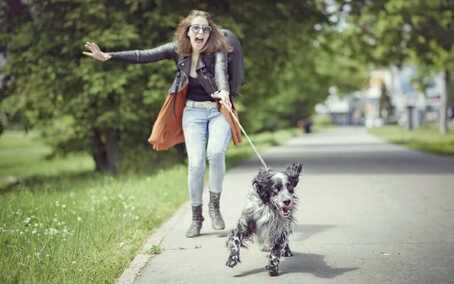|
Having a ‘teenager’ is tough. I don’t care how many dogs you’ve had or how much time you put into your puppy training and socialisation skills – everyone (yes me too) has challenges to deal with during adolescence. If you can accept that, then the journey is going to be so much more enjoyable.
Why do we beat ourselves up with the ‘I should have done’ or ‘why didn’t I do that’ or ‘I should have spent more time’ etc etc. The guilt we put upon ourselves just doesn’t help and in fact probably stops progress. We send so much time focusing on the ‘what if’s’ that we don’t focus on working through the problem. Anywhere from 5 months up your dog will go through their adolescence period. This could mean challenges such as: being destructive, hyperarousal, reactivity (barking/lunging), prey drive, guarding, forgetting even the simplest cues and becoming the over the top, over social dog that must go and see every dog and person in the park! Does that sound familiar? Do you remember going through your teenage years? Everything is changing. Body, brain, hormones are raging, and nothing makes sense. It’s time to explore the world but then fear kicks in and it’s too overwhelming. Do you remember? It’s tough. It takes time. It takes patience. This is the time that you will definitely question whether getting a dog was a smart choice. It all just feels too hard. I am here to tell you it’s all normal. It’s all ok. This is a phase that I really want to give you permission to have days where you just except that your dog doesn’t know what sit means and their manners have totally disappeared. To give yourself a day off to not focus on the really long list of skills your dog still needs to learn. Stop, look, enjoy the now larger fluff ball that you are sharing your life with. Understand that not everyday needs to be a school day. Find out what they love to do and get involved. Focus on managing their environment so that they cannot rehearse the behaviour you don’t want them to do. Dr Susan Friedman said “control the environment not the animal”. I love this because we can control the environment with planning. One of my go to sayings is “don’t set your dog up to fail”. If you know it might go wrong, why are you doing it? Traditional punishment training mindset tells us that we must focus on controlling the individual, but actually we need to focus on the conditions where the behaviour occurs. We can help our dogs learn by making the behaviours we want from them easy to achieve and therefore reward them for those choices. Thus making that ‘good’ behaviour choice more likely next time. The good – it does get better The bad – it’s going to take time and patience and a good sense of humour to survive The Ugly – every dog will have their own challenges (but they can all be worked through) I hope that has given you at least a little peace of mind today. If you do want any support, please get in touch. Jo x
0 Comments
Have you ever seen a dog pick up an object, glance at you and run away? What do you think they are doing here? It might be their way of instigating a game with you, trying to get your attention or does it show that they have started to worry that you might try and take their ‘precious’ find as they feel the need to move away from you?
If it’s the latter, then may I encourage you to start working through this potential problem. Resource guarding is a totally natural dog behaviour. Why wouldn’t they protect and guard something they find valuable? Doesn’t matter if you are a dog or a person. Food, toys, socks or even a piece of litter they have just come across. Gundogs in particular have been bred to pick up and hold onto objects, so although all breeds can resource guard, some breeds are more predisposed to it. I understand why you feel the need to take the item off your dog. It’s your sock and you don’t want it chewed; it’s the TV remove control and that is expensive; it’s a stone and therefore might be dangerous if swallowed. There are many ‘human’ reasons why you take the item from your dog’s mouth. However, that is human logic and not canine. Canine logic is ‘finder’s keepers’! If they found it, it’s theirs. When we take it from them you are teaching them you are a thief! You are the one that steals – and there you were thinking your dog was the one that always steals things! You have given your dog 3 options:
All of these responses are not what we want from our dogs, but we have to accept that this behaviour is usually made so much worse by our lack of knowledge of how to read our dogs behaviour and that we need to understand their motives. Let’s talk body language. One of my favourite topics and I will only go into some basics here. In short, it’s our responsibility that if we want to share our lives with our dogs, we must learn how they communicate with us and learn to understand them. Signs that your dog is feeling uncomfortable are: Freezing: your dog is very still, possibly crouching down and very stiff. Whale eye: you can see the whites of your dog’s eye looking at you. Usually whilst they are freezing. Growling: maybe an obvious one, but if your dog is doing a low growl, then they are very clearly saying, back away, I am worried. Snarling: lifting their lips and showing their teeth. Biting: using their teeth is the last step on the aggression ladder. The final step. The other steps haven’t worked and therefore there is no other choice. When you see your dog communicating that they are uncomfortable please listen. We don’t want them to have to progress to using their teeth. No one wants that. If you have children at home, can you see how easy this situation could lead to a bite? However our responses to them showing any guarding behaviour are usually to punish them as they are ‘misbehaving’ so we remove the item they are guarding as a consequence of this unacceptable behaviour. Please stop. Think. From your dog’s perspective, what has just happened? They felt uncomfortable with your presence, they tried to communicate to you to ‘please stop, please move away’ but we didn’t listen. The thing they were worried about happened – they lost their precious ‘find’. The learning occurring here is that you are a thief, you are threatening and therefore next time they find your slipper or TV controller they won’t give any low-level communication such as freezing or growling, they will have to defend with their teeth. Can you see how this is actually just a miscommunication? Your dog is doing their very best to say that they aren’t ok. However, we don’t listen. We actually can make it much worse as we take away their special prize. Take time to train your dog to understand drop and leave cues. Use reward-based training so show them that they don’t need to feel threatened and can then happily respond to your requests of drop or leave. Take time to show them that when you approach them when they have food, toys or anything else, that they don’t need to protect this item. Sharing is a human concept that dogs don’t understand. Dogs are scavengers so very likely to want to pick up lots of items, so it’s our responsibility to train so dangerous situations do not arise. Jo x |
Archives
June 2024
|
|
© COPYRIGHT Paws4teaching 2023
Terms and conditions |





